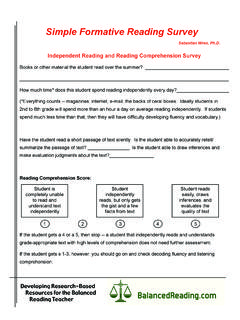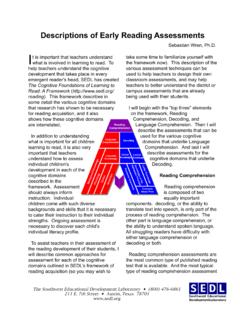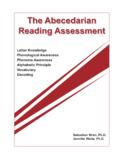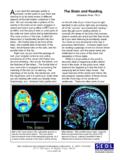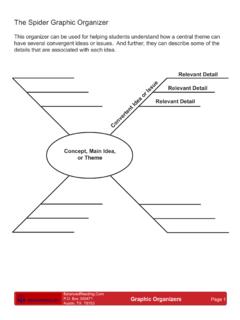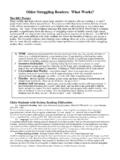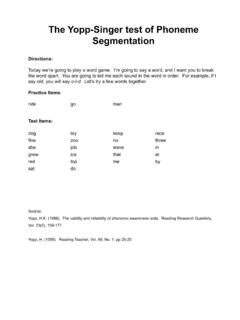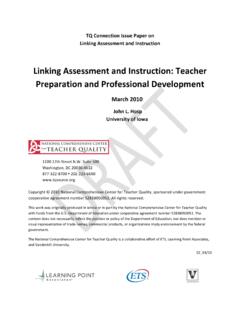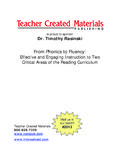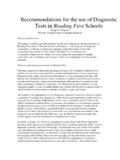Transcription of The Abecedarian Reading Assessment
1 The Abecedarian Reading Assessment Letter Knowledge Phonological Awareness Phoneme Awareness Alphabetic Principle Vocabulary Decoding Sebastian Wren, Jennifer Watts, The Abecedarian Reading Assessment Copyright, 2002. Sebastian Wren, Jennifer Watts, Box 300471. Austin, TX 78703. a be ce dar i an /a-be-se-dar-e- n/ n [ME abecedary, fr. ML. e abecedarium alphabet, fr. LL, neut. of abecedarius of the alphabet, fr. the letters a + b + c + d] (1603) : 1. one learning the rudiments of something (as the alphabet) 2. of or relating to the alphabet 3. alphabetically arranged 4. RUDIMENTARY. Abecedarian Table of Contents Overview .. 1. Letter Knowledge Introduction .. 5. Student Sheet .. 6. Score Sheet .. 7. Phonological Awareness Introduction .. 8. Rhyming Perception .. 9. Phoneme Identity - Perception .. 10. Rhyming Production .. 11. Phoneme Identity - Production .. 12. Score Sheet .. 13. Phoneme Awareness Introduction .. 15. First Sounds .. 17.
2 Last Sounds .. 18. Segmentation .. 19. Score Sheet .. 20. Alphabetic Principle Introduction .. 21. Student Sheet .. 22. Score Sheet .. 23. Vocabulary Introduction .. 24. Production .. 25. Antonyms .. 26. Synonyms .. 27. Score Sheet .. 28. Decoding Introduction .. 29. Fluency .. 30. Fluency - Student Sheet .. 31. Irregular Words .. 32. Irregular Words - Student Sheet .. 33. Regular Words .. 34. Regular Words - Student Sheet .. 35. Score Sheet .. 36. Appendix A .. 37. Abecedarian Overview Effective Reading instruction begins with Assessment . Individual children come to class with such diverse literacy backgrounds, it is not safe to assume that they will all learn to read the same way and that they will all benefit equally from classroom lessons. Reading is a skill, and as such, teachers should begin by determining what skills and knowledge each child already has, and the teacher should customize instruction to the individual learning needs of the students (see the section titled D is for Developmentally Appropriate Instruction at ).
3 Just as the piano teacher finds out what a pupil knows about music before beginning instruction, so too should a Reading teacher find out what a student knows about Reading . The Abecedarian was designed to provide diagnostic information about early Reading skills. Using this Assessment information, teachers can maximize their effectiveness by individualizing their instruction to each student's learning needs. Criteria The Abecedarian is divided into 6 major subtests. Most of these subtests are further broken into a variety of tasks. The subtests and the tasks were selected and created with the best research information available (see Appendix A). Research has clearly shown the benefits of developing all of the knowledge domains tested by the Abecedarian early. The preponderance of research evidence suggests that children who have phoneme awareness in kindergarten are much more likely to be successful readers in third grade than children who lack phoneme awareness.
4 Similarly, knowing the letters of the alphabet is one of the best predictors of Reading success. The same is true of knowledge of the alphabetic principle and word recognition skills. Vocabulary knowledge both predicts and is a result of Reading success, as is decoding fluency. It is recommended that all students be able to pass the Letter Knowledge, Phoneme Awareness, and the Alphabetic Principle subtests by the beginning of the first grade (passing being no more than two errors). By the end of the first grade, students should be able to pass the rest of the subtests. Students who are still struggling with any of these measures in the second grade are at a very high risk for Reading failure (See information on the consequences of Reading failure and the Matthew Effect at ). Ground Rules It is probably not necessary to give every part of the Abecedarian to every student - teachers should be strategic. For example, if a student passes the Decoding - Fluency section, it is surely not necessary to give that student the Letter Knowledge or Alphabetic Principle assessments.
5 Similarly, if a student is struggling with the Letter Knowledge Assessment , then it is unlikely that student will perform well on the Decoding section. These assessments increase in difficulty (see flowchart), and the teacher should take that Abecedarian Reading Assessment Page 1. into consideration. The philosophy that underlies the Abecedarian is that Assessment is important to inform instruction, but exessive Assessment is a waste of time. We believe in time on task, and assessments should be given sparingly, and assessments that are given should be as informative as possible. That said, we do feel it is important that this Assessment be given by the classroom teacher. Administering this test first-hand is very informative, and teachers should not miss this opportunity to get to know their student's literacy skills better. There is one notation you should be familiar with before administering the Abecedarian . In this Assessment sometimes speech sounds (phonemes) are described, and where speech sounds are described, slashes are used to indicated that we are referring to a speech sound and not a letter.
6 For example, the sound /k/ represents the letter k -- the sound /k/. is the first sound in cat and kite.. The organization of this Assessment is somewhat hierarchical, but teachers should use their best judgement to decide what assessments are given to each child and in what order. Ideally every kindergarten child will complete some of the Phoneme Awareness and Phonological Awareness tasks, and every kindergarten and early 1st grade student should take the Letter Knowledge test. The Vocabulary assessments are always appropriate at either kindergarten or first grade, but the Decoding assessments should only be given to children who have a strong foundation in the more basic pre- Reading skills. By the end of the first grade, however, every teacher should be confident that every one of her students can pass all of these assessments. The research base that was used to inform the creation of the Abecedarian clearly indicates that early mastery of each of the knowledge domains assessed by the Abecedarian is critically important to Reading success (see Appendix A).
7 Each subtest of the Assessment starts with an introduction and overview of the subtest, then instruction sheets and student sheets come next, and at the end of each section is a score-sheet. You will need one copy of that score sheet for each child. There is a downloadable version of the score-sheets at if you would like one PDF version of just the score sheets (to make it easier to copy), it is free for people who have purchased the Abecedarian . Flowchart Individual children learn to read in individual ways. That means that what may be easy for one child may not be so easy for another. It is not accurate to say that developing letter knowledge is easier than developing phoneme awareness or knowledge of the alphabetic principle, but it is accurate to say that most children gain letter knowledge earlier than these other knowledge domains. It is also accurate to say that children who can decode individual words fluently must have well developed letter knowledge and knowledge of the alphabetic principle and phoneme awareness.
8 Those knowledge domains are prerequisites for fluent decoding skill. Abecedarian Reading Assessment Page 2. We have attempted to create a flowchart to represent the way these knowledge domains relate to each other, and to give some information about how teachers can be strategic in thier Assessment of early literacy skills. Unfortunately , while this flowchart is deceptively simple, children are diabolically complicated. However, this is still a good place to start. Keep in mind that the flowchart does not indicate the order that assessments should be given -- it indicates the order that most children develop these skills and knowledge domains. There are six knowledge domains that can be assessed with the Abecedarian , and the flowchart organizes these domains, top to bottom, from most advanced to most elementary. Further, under most of the six knowledge domains the more basic tasks that can be used when giving the Abecedarian are listed.
9 These tasks, like the flowchart itself, are also ordered from most advanced to most elementary.. Using this flowchart, teachers should be strategic about giving Assessment . To a certain extent, it is necessary for the teacher to use his or her discression when determining where to begin testing different children. However, we have some tips that may be useful. All children should get the vocabulary Assessment , and it is probably a good idea to give all three tasks of the vocabulary Assessment . Vocabulary development is a life-long process, and all teachers should frequently assess the vocabulary development of their students. The most advanced children should begin with the decoding tasks -- if a child performs well on the decoding fluency task, there is probably no need for further Assessment with the Abecedarian (other than vocabulary). A child who can decode words fluently has moved beyond the basic skills assessed by the Abecedarian and is ready for more advanced Reading instruction.
10 If the child does not perform well on the fluency section, then the more elementary Abecedarian subtests should be administered. Most children in Kindergarten and early first grade should begin with the letter knowledge and phoneme awareness tasks (and vocabulary, of course). With the phoneme awareness Assessment , begin with segmentation. If a child passes the segmentation Assessment , then no more Assessment in phoneme awareness or phonological awareness is necessary -- move on to the alphabetic principle task. The more basic phoneme awareness and phonological awareness assessments are provided to get more information about children who cannot do the phoneme segmentation task. Understanding how these knowledge domains relate to each other and build on each other will help a teacher to be as efficient as possible in his or her Assessment . Ideally, most children will only need to take a few subtests from the Abecedarian to give a teacher a good understanding of what instruction would best benefit that child.
